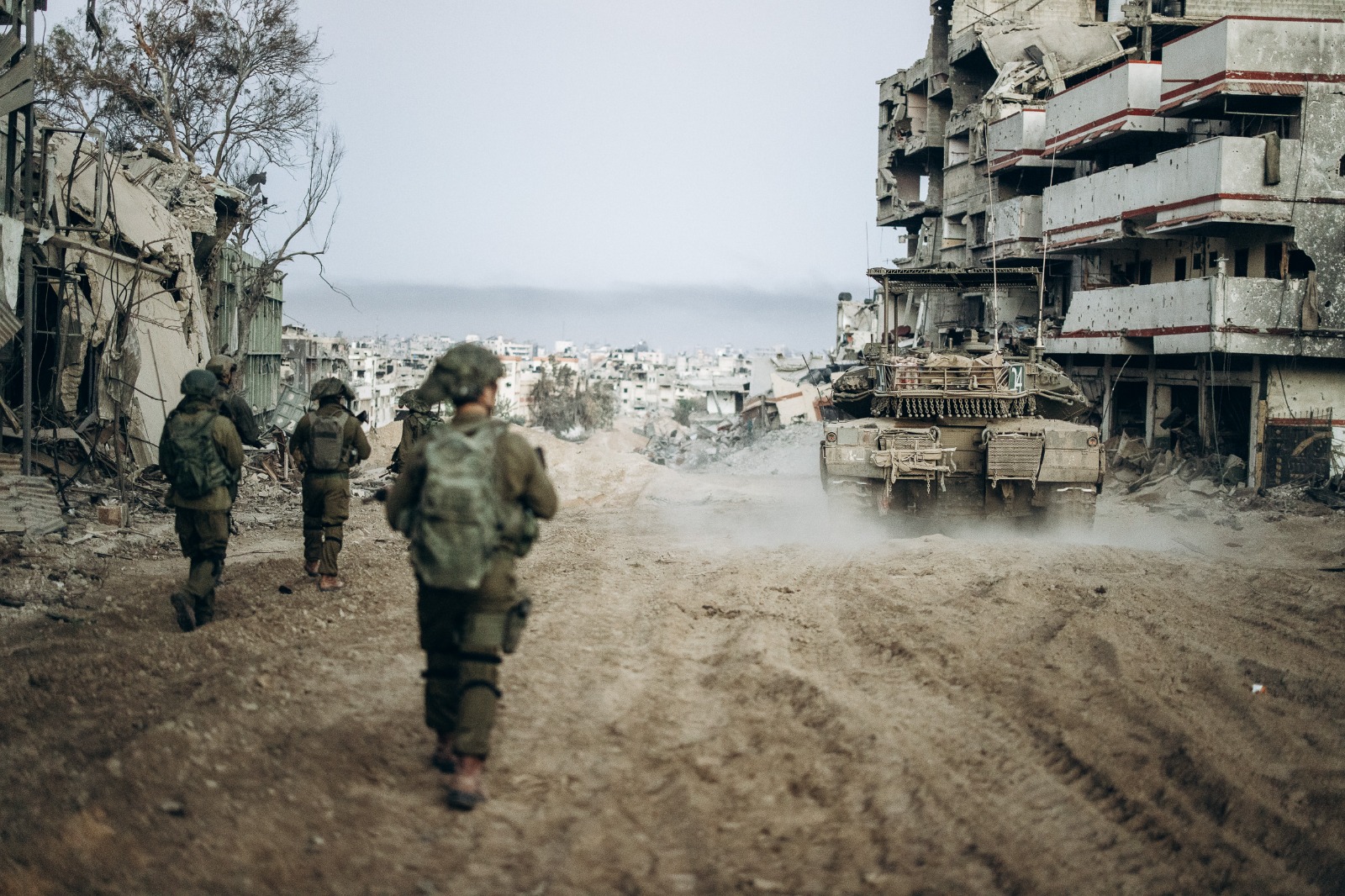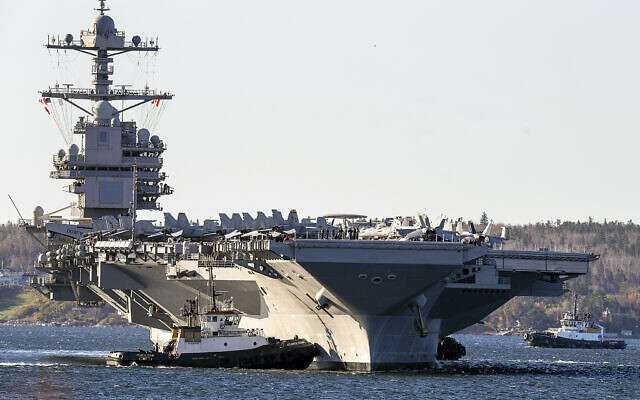



The Times of Israel is liveblogging Tuesday’s events as they unfold.
US official: Biden admin pushed Israel for lower-intensity fighting in Gaza, troop withdrawal
Israel’s plans to withdraw some forces from combat in the Gaza Strip appear to signal that Israel is shifting to lower-intensity fighting in the Palestinian enclave, a move the Biden administration has been pushing for, a US official tells NBC News.
The official notes that fighting is still happening in northern Gaza and there were no immediate changes to operations in southern Gaza.
The IDF said Sunday it was beginning to release five brigades from combat in Gaza, as the military increasingly gains control on the ground.
On Monday, Israeli military officials said they were preparing for residents of some Gaza border communities that have largely been empty since October 7 to begin returning home soon, amid further indications the fighting was shifting into a lower gear in the northern part of the Strip, after three months of punishing all-out war.
Israelis in communities within seven kilometers (4.3 miles) of Gaza were mostly evacuated in the immediate aftermath of the October 7 assault on southern Israel by the terror group, which rules the Strip, when terrorists massacred 1,200 people, mostly civilians, and kidnapped some 240 people to Gaza.
Israel responded to the October 7 massacres with a military campaign – including a major ground incursion – aimed at destroying Hamas, removing it from power in Gaza, and rescuing the hostages.
The military said it believes the war against the terror group will likely continue throughout 2024, and said it was prepared for lengthy fighting, though in different phases from the high-intensity campaign it has waged so far.
The chief of the IDF’s Southern Command, Maj. Gen. Yaron Finkelman, said Monday that the fighting in Gaza “will continue in a variety of methods, in a variety of intensities, and in varying forms.”
Israel Defense Forces Chief of Staff Lt. Gen. Herzi Halevi said last week that the military is expanding its operations in southern and central Gaza as it is close to dismantling all of Hamas’s battalions in the northern part of the Strip, but he warned that the war will last “many more months.”
Hezbollah says four members killed tonight in south Lebanon strikes
Lebanon’s Iran-backed Hezbollah terror group says on its Telegram account that four of its fighters were killed in southern Lebanon. Hezbollah initially said three were killed before updating the number to four later in the day.
The statement gave no detail about how the four were killed but said they “were martyred on the road to (liberate) Jerusalem.”
Security sources said the first three were killed in Israeli strikes on two houses in the Lebanese village of Kafr Kila near the border where Hezbollah maintains security control.
Hezbollah, an ally of Palestinian Islamist terror group Hamas, has been exchanging near-daily fire with Israel across Lebanon’s southern frontier since the eruption of the Israeli-Hamas war in Gaza in early October, when thousands of Hamas-led terrorists killed 1,200 people and took some 240 hostages.
The Israeli military said on Monday it struck a series of targets in Lebanon, including “military sites” where Hezbollah was operating.
Since October 8, Hezbollah-led forces have attacked Israeli communities and military posts along the border on a near-daily basis, with the group saying it is doing so to support Hamas.
Hezbollah has named 138 members who have been killed by Israel during the ongoing skirmishes, mostly in Lebanon but some also in Syria. In Lebanon, another 19 operatives from other terror groups, a Lebanese soldier, and at least 19 civilians, three of whom were journalists, have been killed.
The skirmishes on the border have also resulted in four civilian deaths on the Israeli side, as well as the deaths of nine IDF soldiers. There have also been several attacks from Syria, without any injuries.
Anti-Israel protesters in caravan of cars with ‘intifada’ graffiti restrict access to busy NYC airport
Access to a busy terminal at New York’s John F. Kennedy International Airport was restricted Monday as pro-Palestinian and anti-Israel protesters converged on the airport for the second time in a week.
Videos posted online show heavy traffic and a slow-moving line of cars, some flying Palestinian flags and featuring text on the windows such as “intifada,” “f*ck Israel,” “long live the resistance [Hamas]” and “stop the genocide.”
Police directed a line of cars around a checkpoint. Protesters also had planned to arrive at the airport in Queens, New York, by public transportation.
NEW: Pro-*Hamas* protesters are targeting JFK International Airport in New York, forcing delays on one of the most traveled days of the year.
Welcome to the new normal, America.
Many of the protesters were masked as they harassed the New York Police Department, comparing them… pic.twitter.com/2W3UT02wNp
— Collin Rugg (@CollinRugg) January 1, 2024
The New Year’s Day action was the latest in a series of protests around the nation calling for a ceasefire since the Israel-Hamas war broke out on Oct. 7 when thousands of terrorists invaded Israel and killed 1,200 people, mostly civilians, and took another 240 as hostages to the Gaza Strip. Last Wednesday, activists brought traffic to a standstill on an expressway leading up to JFK for about 20 minutes. Protesters shut down a major thoroughfare leading to the Los Angeles International Airport on the same day.
Entry into JFK’s Terminal 4 was temporarily restricted Monday afternoon to ticketed passengers, employees and people with what authorities consider a valid reason to be there, such as passenger pickups, according to the Port Authority of New York and New Jersey, which operates the region’s airports.
Similarly, AirTrain access was temporarily restricted to ticketed passengers and employees.
“The Port Authority, in coordination with our local, state, and federal partners, has deployed safety and security measures to help ensure an uninterrupted travel experience at JFK,” port authority spokesperson Seth Stein said in an email.
The Port Authority of New York and New Jersey didn’t report any arrests.
City officials had warned people flying out of JFK on Monday, a busy travel day, to get to the airport early because of the protests.
Police said the caravan of cars was later headed to protest outside LaGuardia Airport, which is also in Queens.
US carrier sent to Mediterranean after Hamas Oct. 7 massacre to return to base

The US aircraft carrier USS Gerald R. Ford, deployed to the eastern Mediterranean after the deadly attack on Israel by Palestinian terror group Hamas on October 7, will return to the United States “in the coming days,” the US Navy says.
Sent to “contribute to our regional deterrence and defense posture,” the carrier will “redeploy to its home port as scheduled to prepare for future deployments,” the Navy announces in a statement.
“The Department of Defense continually evaluates force posture globally and will retain extensive capability both in the Mediterranean and across the Middle East,” the statement adds.
The Navy says it was “collaborating with Allies and partners to bolster maritime security in the region.”
It notes that the Defense Department will continue to rely on the presence of its forces in the region — including the USS Dwight D. Eisenhower carrier strike group — “to deter any state or non-state actor from escalating this crisis beyond Gaza.”
A new generation aircraft carrier, the USS Gerald R. Ford is a 100,000-ton nuclear-powered ship equipped with new technologies.
After Hamas’ murderous assault on Israel on October 7 — when Palestinian terrorists killed 1,200 people, mostly civilians, and took some 240 hostages — Washington provided military support to Israel and reinforced its forces in the region, including the USS Gerald R. Ford and other warships. It came with a warning to Iran, Hamas’s backers, and Iranian proxy Hezbollah in Lebanon.
